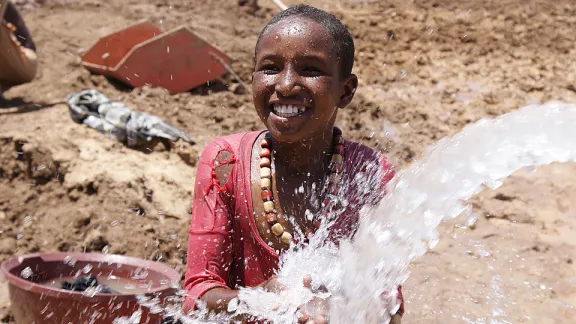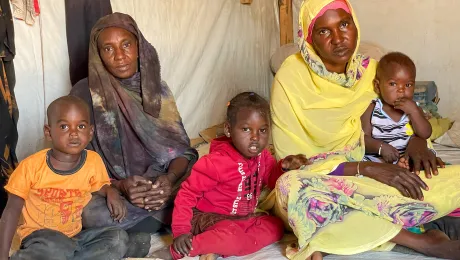
A splash of fresh water from a newly constructed borehole at Teferi Ber refugee camp, Ethiopia. © LWF/R. Bueno De Faria
Timely Delivery of Safe Water through LWF’s Cooperation with Local Communities
“Water Cooperation” is the theme for this year’s World Water Day, marked globally on 22 March.
For The Lutheran World Federation (LWF), World Water Day 2013 is an opportunity to highlight how decades of collaboration with local and international partners facilitate the timely delivery of safe drinking water to people caught up in conflict and weather-related disasters across the world.
This short video shows how the LWF Department for World Service (DWS) supports local communities in making better use of available water resources, with a goal to improving livelihoods and ensuring a life with dignity.
The United Nations has dedicated 2013 as the International Year of Water Cooperation, coinciding with the 20thanniversary of the day set aside to focus on the importance of fresh water. According to UN sources, an estimated 780 million people globally do not have access to clean drinking water, and nearly 2.5 billion lack adequate sanitation.
LWF collaborates with local communities to provide safe water for vulnerable groups in Ethiopia, Nepal and South Sudan.
Ethiopia: As one of the largest global implementing partners of the UN High Commissioner for Refugees (UNHCR), LWF is involved in caring for more than 200,000 Somali refugees in seven camps inside Ethiopia. At the Dollo Ado refugee camps, the LWF country program provides water, hygiene and sanitation to more than 37,000 Somali refugees and 8,000 members of the hosting community. Boreholes are the main sources of water supply, powered by diesel generators and emerging pumping technologies using solar energy.
Elsewhere in the country where the LWF program has been present since 1971, integrated community development projects in arid and semi-arid areas work against the migration of pastoralists by supplying water to people and their livestock. In the northeastern district of Jijiga, local residents are actively involved in the construction of improved traditional water storage ponds (birkas) to harvest run-off water during rains, securing water for use when the dry season sets in. Between 2009 and 2012, LWF Ethiopia and communities in the district built 12 birkas, directly benefiting some 80,000 pastoralists. The supply of clean water to pastoralists has contributed to a significant decline in migration to neighboring regions, and reduced the incidence of conflicts between ethnic groups over grazing grounds and watering points.
South Sudan: Through the DWS country program in South Sudan, the LWF continues to support reconstruction efforts in the newly independent country, recovering from decades of conflict with Sudan. Over 200,000 people including returnees from Sudan and from refugee camps in other neighboring countries directly benefit from community based involvement in the delivery of safe drinking water, sanitation and hygiene services, in providing education, and promoting peace building and food security initiatives.
During the rainy season, huge populations in low-lying parts of South Sudan are especially vulnerable to flooding when the River Nile banks burst. Unusually heavy rainfall in the June to September 2012 period affected an estimated 220,000 people in Jonglei State alone, destroying crops, houses and basic infrastructure including roads. Thanks to collaboration between the LWF and local residents in 2011 and 2012, it was possible to repair a dyke protecting an area of 34-square-kilometers, originally constructed by the government in the early 1980s to mitigate the effects of heavy rainfall and provide alternative livelihoods such as fishing.
In Twic East and Duk counties in Jonglei, around 33,000 returnees currently receive LWF’s support towards small-scale farming and fishing.
Nepal: In Nepal, where the LWF country program has been supporting refugees from Bhutan since 1991, provision of safe drinking water, sanitation and hygiene, and creating opportunities to make a living are major components of LWF’s cooperation with the host communities and refugees.
Although the Bhutanese refugee population declined from 110,000 in 2006 to around 54,000 in December 2012 due to large-scale departure for third-country resettlements, access to water and livelihood support remain key priorities. LWF Nepal has recently constructed a reinforced concrete water tank with a capacity of 100,000 liters at the Beldangi refugee camp in eastern Nepal.
Since 2010, LWF Nepal has also been providing assistance to more than 13,300 Tibetan refugees and over 2,000 host community members in different locations across the country. Support to both communities includes construction of improved irrigation methods to enhance livelihood opportunities.
(The LWF country programs in Ethiopia, Nepal and South Sudan contributed to this article.)


